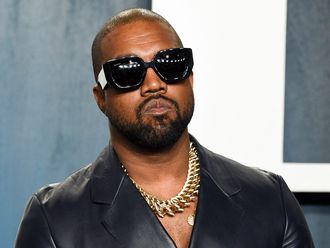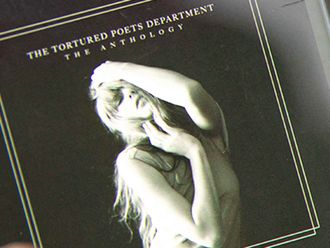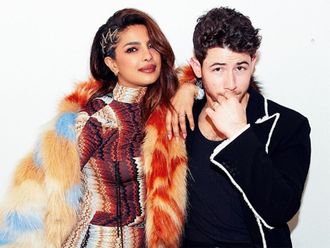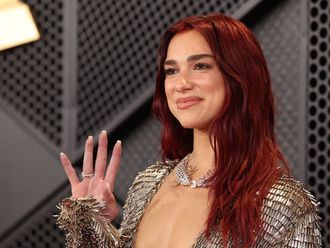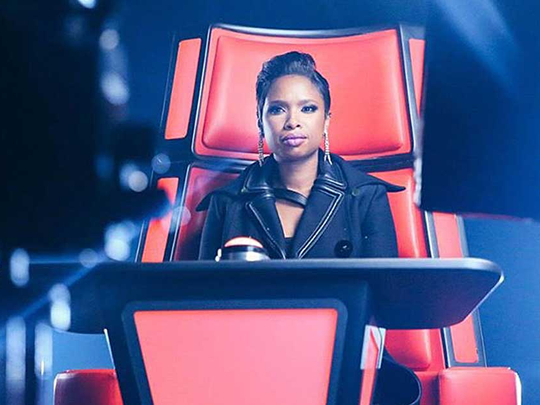
It isn’t often Jennifer Hudson is asked to simmer down and be quiet. It’s rarer still she manages it. The 35-year-old American is, she concedes, “always, always singing. You cannot stop me. I do it all day every day, and have done ever since I was a baby.”
In fairness, over the past decade, that compulsion — not to mention talent — has yielded a dizzying return: an Academy Award, a Grammy, three albums, a Broadway hit and scores of electrifying live performances.
For the next few months, though, as Hudson joins the coaching panel of ITV’s rebooted talent show The Voice, viewers on Saturday nights will be graced with the rare sight of her [mainly] silent, patiently listening to others belt out hits behind her. “You know what?” Hudson says. “I actually loved being able to sit back and be sung to for once.”
Meeting in the corner of a deserted Central London bar on a midweek evening, Hudson declares she’s “exhausted” from jet lag but shows no sign of that whatsoever.
Her pixie haircut, figure-hugging black dress and posture remain immaculate, and she talks surprisingly softly, albeit with total conviction.
“Above all I’m obsessed by music, so getting to hear new talent and learn about all the different styles of voices has been totally fascinating. I don’t get to do that a lot,” she says.
Launched with its first auditions programme last Saturday, The Voice was acquired by ITV in 2015 when the BBC called a halt to its own, waning version of the show. That ran for five series, the last of which only managed to pull in five million viewers for its final — roughly a third of the number that watched last year’s Great British Bake Off finale.
Resisting temptation simply to hurl money at it, ITV has remained generally faithful to the original Voice format. Alongside the star signing of Hudson is a coaching panel comprising rapper and producer will.i.am, the only person to have appeared in every series; Tom Jones, who was axed after four years on the BBC’s version; and Bush frontman Gavin Rossdale.
In many ways, Hudson is the ideal choice to join The Voice. Raised on the gritty South Side of Chicago with her two sisters and brother, the family — led by her bus driver father, who died in 1999 — were desperately poor, so much so that Hudson was forced to sleep in a bed with her mother until she was 16. They took solace from the community Baptist church, though, and that’s where she learnt to sing, solo-ing for the choir at seven.
“The church is where I fell in love with music,” she says. “We would be singing to a higher power, so it was all about the experience. I only opened my eyes while singing when I was 18.”
Faith was so strong in her household, in fact, that she didn’t hear a secular song until her teens, and didn’t sing one until her twenties. “The first was Cheryl Lynn’s [1978 disco classic] To Be Real. I just stared at the record player like it was a television. I was transfixed. It was the greatest thing I’d ever heard,” she recalls.
Hudson’s voice now is one of staggering power and range. Able to spin on a sixpence between light and shade, she can sound at times sultry and mellifluous, at others like pure, righteous thunder. Listening to hopefuls on The Voice, one can see how seriously she takes the art form.
“If a note goes wrong, my body reacts. I’ve got sympathy for them, but there’s no point lying.”
Unlike the other coaches, Hudson knows precisely how those contestants are feeling. In 2004, when she was 23, she found fame on the third series of American Idol, auditioning for Simon Cowell with Aretha Franklin’s Share Your Love With Me. Cowell responded with a simple, “very good,” - but Hudson went on to finish only 7th in the final.
“At the time, Simon told me I was ‘Too big, in every way’,” Hudson remembers now, still in disbelief. “I think he meant my hair, my voice, my personality, my songs. I didn’t really understand how that was a negative thing. I said, ‘Is big not what a star is?’
“His role on that show was mainly to look at image, I think, and I wouldn’t really pay any attention to what he says about vocals. That’s not his thing,” she says, dismissively.
Cowell’s talent-spotting antenna let him down that day. Reliably, Elton John was kind enough to let him know, calling the decision “incredibly racist”, and then inviting Hudson to perform with him on The Oprah Winfrey Show.
There were even suggestions that Hudson’s image — she was a size 16 at the time, although she has lost a lot of weight since — could have played a part in her dismissal.
If proving Cowell wrong was her intention, Hudson’s next step did just that. Just a year after American Idol, she made her acting debut by winning the role of Effie White in the film adaptation of the Broadway musical Dreamgirls, inspired by the story of the Supremes.
Hudson beat Fantasia Barrino (Cowell’s eventual winner) and 781 others to the part. She joined a cast that included Beyonce Knowles, Jamie Foxx and Eddie Murphy. Thanks largely to her show-stopping number And I Am Telling You, she outperformed the lot, winning the Oscar for Best Supporting Actress in 2007.
The next year, a self-titled RnB album was released. That won a Grammy, meaning she joined Barbra Streisand as one of only two performers whose acting and singing debuts have won those eminent prizes.
“It’s insane, even looking back now,” she says. “And my ‘story’ after American Idol is even more crazy.”
She pauses. In 2008, at the height of her album fanfare, Hudson’s mother and brother were found shot dead inside the family home in Chicago, and her seven-year-old nephew was missing. Three days later, his body was found nearby. All three were killed by William Balfour, the estranged husband of her sister, Julia.
Hudson was a major part of the trial that saw Balfour receive three life sentences. Later, she and Julia set up a foundation for the families of gun violence. “We both wanted to find a way that we would not dread every birthday and holiday and family occasion again,” she told Oprah at the time. “There were so many shocks involved in it. Like, who do I grieve for first?”
Hudson went into hiding for three months after the murders. But since then has thrown herself back into life, saying — astonishingly — that she forgives the killer, getting married and giving birth to a son, David, now seven. And there are rumours of an impending Aretha Franklin biopic.
“I cannot talk about that,” she says, beaming at me with failed coyness. “But it is my dream role, and she and I have met and there are very exciting discussions happening.”
Hudson admits to “a little bit of nerves” ahead of her formal introduction to the British public.
Not that it showed, of course. At the beginning of the pre-recorded episode, all four combined for a curtain-raising performance of Queen’s Under Pressure.
Hudson joined the fray in the manner I imagine she enters any room: glam to the nines, before unleashing a head-turning, thunderbolt of a high note, setting off on an escorted diva swagger to the stage, then making the others (even Sir Tom) look like the star-struck winners of a competition for which the main prize was to try and sing with Jennifer Hudson.



